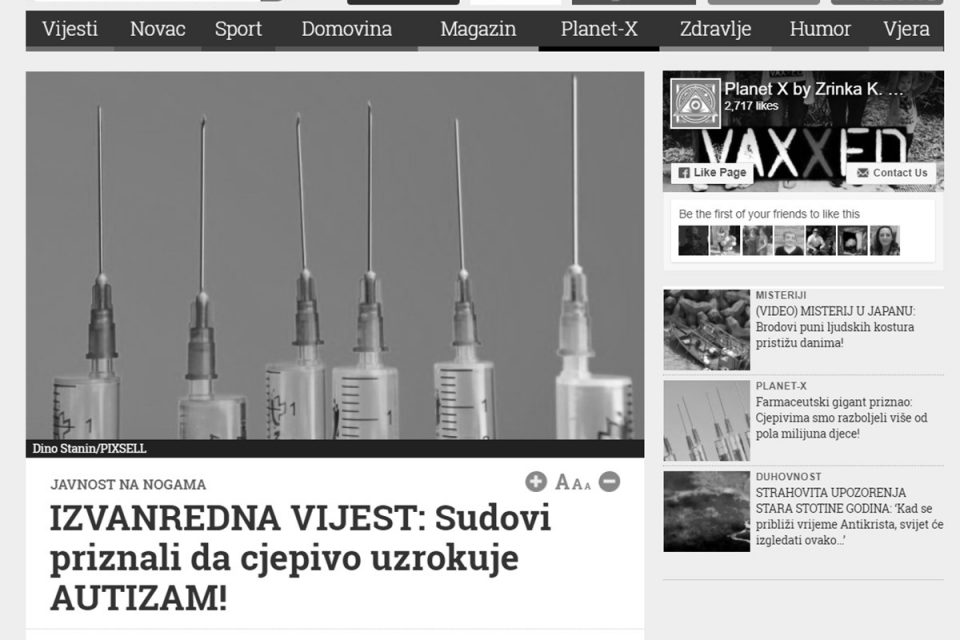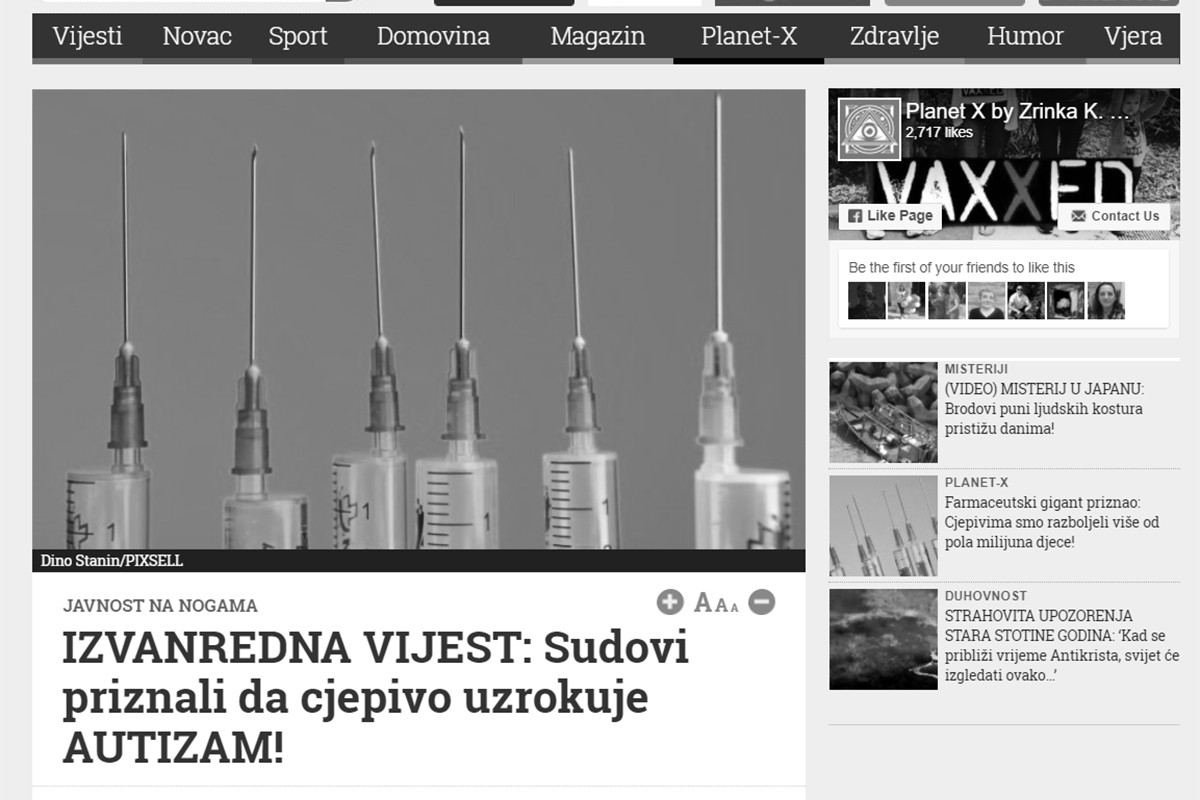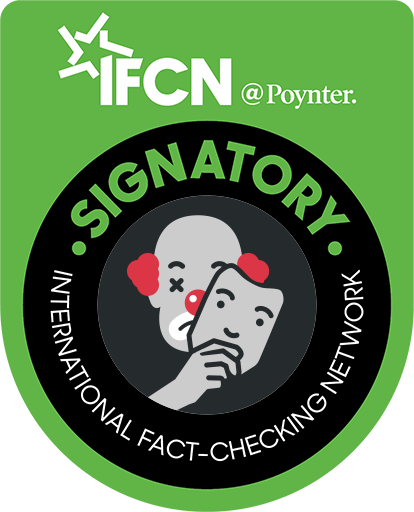We continue to examine the claims in the articles that declared the “victory” of the theory suggesting a causal link between vaccines and autism.

In the previous analysis, we pointed out incorrect allegations that the Special Court in the USA “recognized the link between vaccines and autism”, which was published by a website “Dnevno”, and shared by about twenty other websites.
Here we are dealing with the claims from the same article that refer to another American institution, the Centers for Disease Control and Prevention (CDC).
Health authorities indirectly acknowledged this frightening finding when, back in 1950, they publicly stated that rubella (which is one of the ingredients in this vaccine) causes autism. (…) ‘The rubella virus is one of the few known causes of autism’, the CDC stated on its website under the ‘FAQ’ (frequently asked questions) about MMR vaccines and autism.
We could not verify the part related to the recognition of the health authorities from 1950 because it is unclear which and what kind of “health authorities” the claim refers to. But the clarification certainly followed by referring to data from the US CDC. In the text that served as the source of the article on “Dnevno”, the author Ethan A. Huff made this statement with a remark omitted in the translated text. Huff wrote that the CDC’s “FAQ” page, which talks about causing autism by the rubella virus, has been deleted but is still available in some web archives.
The author of the original article did not attach a link to the mentioned archived content but we still managed to find it on the WebArchive page. Looking at what was written on the CDC website, it is clear that this claim was misrepresented as an argument against vaccination. In the original document, it is stated in an opposite context.
CDC’s position on the relationship between the MMR vaccine and autism
A “FAQ” on the topic of “MMR vaccine and autism” was published in 2000 on the CDC’s website. The oldest version dates from 11.5.2000. and was amended several times in the following years.
In all versions, the CDC emphasizes that the available scientific evidence does not indicate any connection between measles, mumps and rubella vaccinations and the occurrence of autism.
In the document from 2000, the CDC states that they are dealing with this topic because they understand that there is a public interest in it, and that they support further research of the hypothesis. However, although the page was supplemented from year to year with relevant data on scientific studies conducted on this topic, they all reaffirmed that a cause-and-effect relationship between this vaccine and autism could not be established.
A specific claim that the rubella virus can cause autism is given in response to the question: “would it be safer to give vaccines against these three diseases to children separately, in an interval of six months or a year?”
The CDC concludes that this would expose children to unnecessary stress from repeated vaccinations and unnecessary risks of contracting infectious diseases. Among them is the risk of congenital rubella syndrome (CRS), which affects the fetus when a pregnant woman becomes infected with the “wild” rubella virus in early pregnancy. CRS can cause many complications and diseases and even lead to miscarriage or stillbirth. The occurrence of autism is cited as one of its possible consequences.
Here is what is written about this issue on the CDC’s “FAQ” page:
For instance, if the rubella vaccine were delayed, 4 million children would be susceptible to rubella for an additional 6 to 12 months. This would potentially allow otherwise preventable cases of congenital rubella syndrome (CRS) to occur through the transmission of rubella from infected children to pregnant women. Ironically, the infection of a pregnant woman with the “wild” rubella virus is one of the few known causes of autism. Thus, by preventing rubella infection of pregnant women, the MMR vaccine also prevents autism.
There is no trace on the CDC’s website that rubella can cause autism in an already born child. It is only said that the “wild” rubella virus, if it infects a pregnant woman, can lead to fetal disease in the mother’s body, leading to autism.
Aside from not referring to already-born babies, the CDC’s text doesn’t talk about the virus found in vaccines. An article on the website “Dnevno” states that “rubella (which is one of the ingredients in this vaccine) causes autism”. However, the term “wild virus” refers to a virus in the form in which it occurs in nature, and not to weakened or dead pathogens such as those found in vaccines. The nonsense of the whole story is thus raised to a new level since the CDC’s statement refers exclusively to the “wild” virus, and not to the modified ingredient of the rubella vaccine.
Thus, in the text published by the CDC, there is no basis for concluding that the rubella vaccine can cause autism. On the contrary, it is pointed out that any unvaccinated child is a potential danger to unborn children because it can transmit the “wild” rubella virus to pregnant women.
The author of the article further referred to the statements of the former director of the CDC, also misquoting them:
Dr. Julie Gerberding, currently the head of the vaccination department at the pharmaceutical company Merck, admitted that children could develop autism after vaccination. At least 20 percent of vaccine-induced autism cases are linked to mitochondrial dysfunction, etc., but despite these acknowledgments, the public has not opened their eyes, and without any thinking, they hand their children over to these frightening eugenicists, writes kopp.online.
Dr. Julie Gerberding, who was the director of the CDC in 2008, was a guest on the CNN show “House Call With Dr. Sanjay Gupta”, where they discussed autism. The statements given by Gerberding in this show have been misquoted several times by proponents of theories about vaccines and autism. We reviewed the transcript of this show, and, as in the previous claims, we did not find the “confession” described in it. A transcript of the conversation conducted in the show is available at this link.
Julie Gerberding said in the show that the causes of autism are largely unknown but that scientific studies have shown that there is no connection between vaccines and autism. She also referred to the fact that such a connection is still being researched, despite the fact that nothing has been found for years and that time could have been spent on more valuable research. The “20% of cases related to mitochondrial dysfunction” were not mentioned at all.
We note, once again, that this is a ten-year-old interview. When Gerberding spoke about the cases processed at the American “Vaccine Court”, there were still ongoing test cases, which we wrote about in the previous analysis. It was only after these trials that the court irrevocably found that neither of the two theories about the causal link between vaccination and autism had provided valid evidence of such a connection.
Transcript of the original interview with Julie Gerberding
Here is a transcript of Dr. Gerberding’s interview with the host of the show, in the part related to vaccines, which followed the report on cases initiated before the American “Vaccine Court” (as we have already established, in none of them was a verdict which determines the causal link between vaccination and autism).
GUPTA: And one of those 4,900 cases was the case of nine-year- old Hannah Polling, which has been making a lot of news lately. Luckily, we have the director of the Centers for Disease Control and Prevention, Dr. Julie Gerberding here.
We’re talking a lot about autism, as you know. I should remind people that the — my understanding is the federal government conceded that vaccines caused her autism like symptoms. First of all, is there a difference? I mean, does she have autism or autism like symptoms? What’s the difference?
GERBERDING: Well, you know, I don’t have all the facts because I still haven’t been able to review the case files myself. But my understanding is that the child has a — what we think is a rare mitochondrial disorder. And children that have this disease, anything that stresses them creates a situation where their cells just can’t make enough energy to keep their brains functioning normally. Now, we all know that vaccines can occasionally cause fevers in kids. So if a child was immunized, got a fever, had other complications from the vaccines. And if you’re predisposed with the mitochondrial disorder, it can certainly set off some damage. Some of the symptoms can be symptoms that have characteristics of autism.
GUPTA: Yes, I have a two-and-a-half-year-old and a one-year-old as you know. And you know, you know, you think about this all the time. Are we ready to say right now as things stand that childhood vaccines do not cause autism?
GERBERDING: What we can say absolutely for sure is that we don’t really understand the causes of autism. We’ve got a long way to go before we get to the bottom of this. But there have been at least 15 very good scientific studies on the Institute of Medicine who have searched this out. And they have concluded that there really is no association between vaccines and autism.
GUPTA: Are you comfortable everything that we know? So you talk about the…
GERBERDING: Well, I’ll never be comfortable with everything we know. I mean, I think we have to have an open mind about this. We know that there’s very little chance that it’s something related to a vaccine that’s going to cause a serious problem for a child. We also know how life saving vaccines really are.
GUPTA: Yes.
GERBERDING: You know, something like 33,000 children a year are saved from death associated with the vaccines…
GUPTA: Right.
GERBERDING: …because of our immunization program. That’s a huge benefit.
GUPTA: Yes.
GERBERDING: One of the things that concerns me is while the attention is focused on vaccines, in a sense, it means people are not looking for other causes. I mean, we’ve got to keep reminding ourselves that the vaccine story has been one that’s been debated for many, many years now. We keep looking and looking and looking. And we really cannot turn up any information.
GUPTA: How do you — how does the — should the government be doing more to try and address this controversy, especially in the minds of, you know, so many people out there who worry about this and live with this, as you say, every day?
GERBERDING: Well, one thing that I remember is that the government is actually composed of moms and dads. And there are a lot of moms and dads at CDC who look at this the same way. Many of the people in our immunization program are parents of young children. So they understand the dilemma that a parent feels. But it’s kind of our job to do the science to help clarify and separate concern from scientific fact. Autism is a huge challenge. And it is much more common than I think anyone realized. And we aren’t doing enough. And we need to do more.
GUPTA: Yes.
GERBERDING: We need answers not only to the cause, but we need answers for treatment and for management. And certainly on autism awareness day, we need to understand how we can detect this disease early so that intervention can start soon enough to really help these children.
Considering that they are based on falsification of facts and include completely untrue claims, we rate the quoted allegations as fake news and misinformation.
Note
24.5.2020: Two and a half years after the publication of this analysis, the claim that “courts have recognized that the MMR vaccine causes autism” has started spreading again on social networks, this time in the form of a “screenshot” of the original article published on Dnevno (.hr). In the meantime, the article has been deleted from this website.
Accordingly, the analysis is supplemented by new transmissions of misinformation that were analyzed here in December 2017.
26.10.2020: A blog entry from May this year (link) claiming that “the court acknowledged that the MMR vaccine causes autism” was also shared on social networks in October. On 25 October (link), it was shared on a Facebook profile of Jasmina Stijovic, and by the time of this update, it had recorded 717 reactions, 487 users have commented on this post, and it has been shared 287 times. The blog entry was also shared in the Facebook group “Admirers of the character and work of Dr. Branimir Nestorović”, also on October 25 (link), where it recorded 15 reactions and 9 shares.
8.6.2021: Website Ekskluziva corrected incorrect statements in the original article, so in accordance with the changed methodology (link), the article from this website was assigned, and the rate was corrected.
(Author: Tijana Cvjetićanin, Raskrinkavanje.ba)

